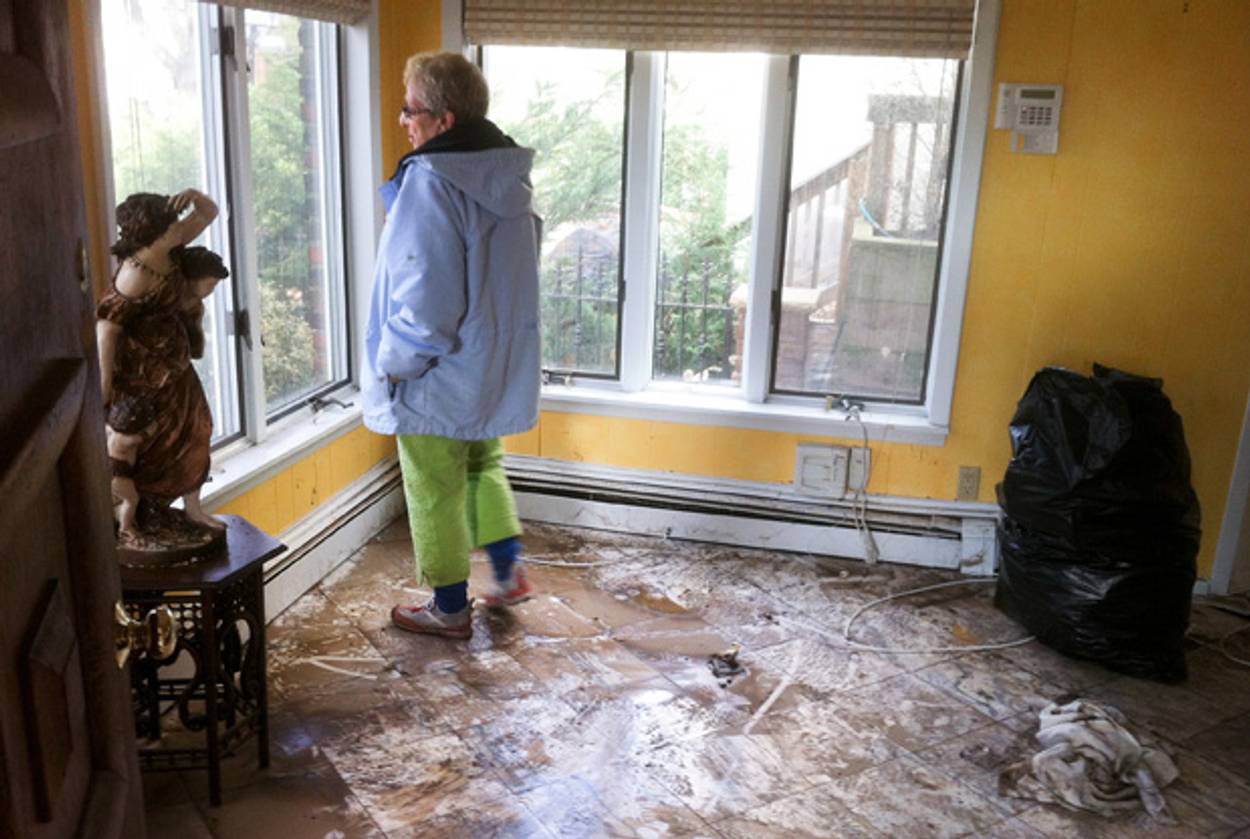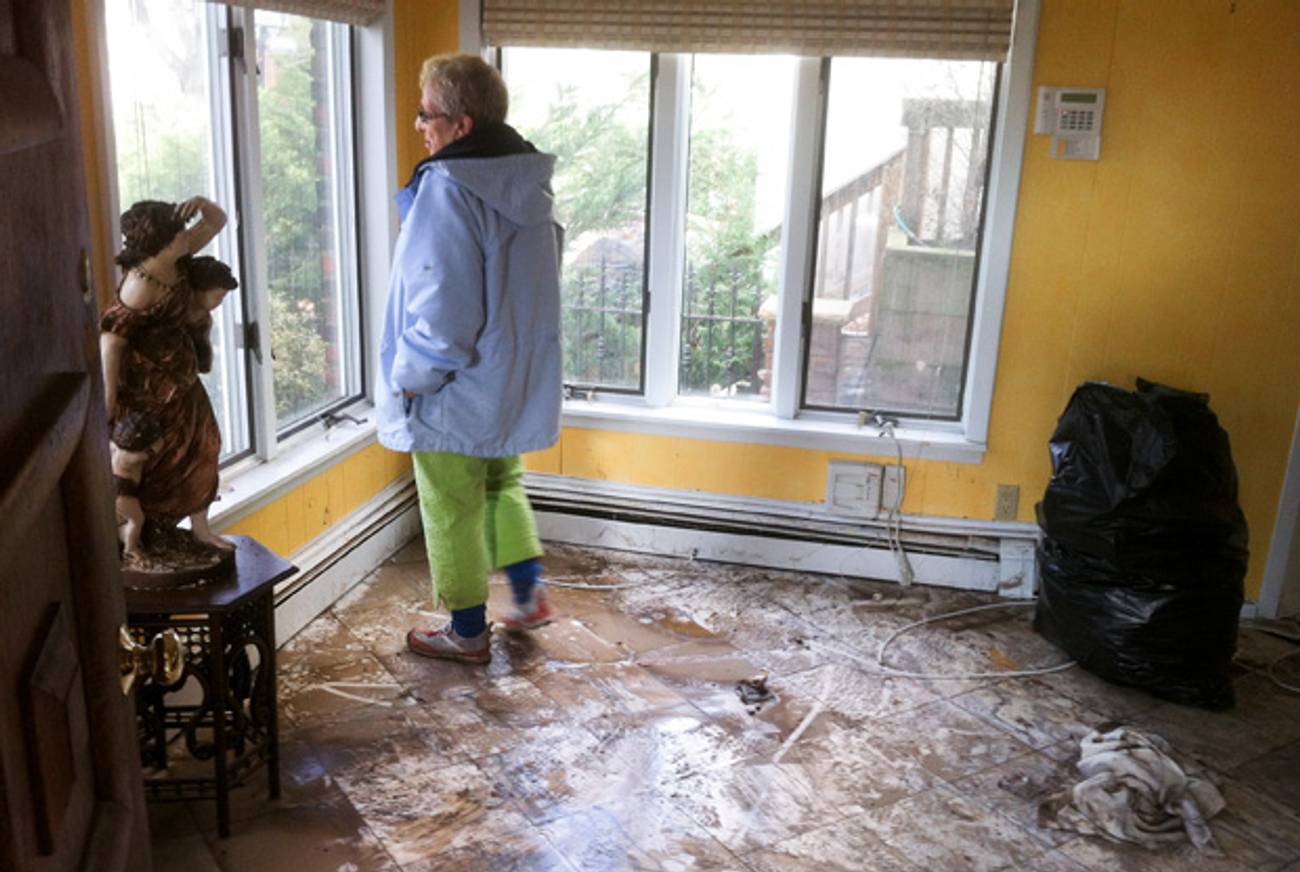After the Flood, Election Fears
A Jewish Democratic couple faces a ruined Rockaways home and fears ‘disaster’ at disorganized polling sites




Harriet and Irving Fiebert have lived in the Neponsit neighborhood of the Rockaways for 30 years without experiencing a single flooded basement. Last Sunday, a day before Hurricane Sandy reached New York, Harriet, 79 years old, and Irving, 82, packed their toothbrushes and headed to their son’s house in Manhasset. “We were undecided,” Harriet said of her hesitancy to leave. “During Irene we all evacuated and nothing happened. We really thought we could stay in the house.”
They returned a few days later to find their home ruined. At some point during the storm, water stood three feet deep in the living room, judging by a layer of silt and muck along the wall. Their son, Eric, pumped out the water that remained, but floating paper, photographs, and other items kept clogging the line. By the weekend the water was gone, but the muck remained. The hardwood floors buckled. Floodwater had rearranged all the furniture. Like everyone else in the neighborhood, the Fieberts spent the weekend throwing things out.
Up and down the street, every house was the same: mountains of soaked sofas and mattresses, dressers, tables, clothes, and toys heaped outside. You could judge a homeowner’s progress by the contents in the yard. A pile of drywall, wainscoting, and crown molding meant you were ahead of the game. Sanitation workers made continuous loops, and people walked out to help them load the garbage trucks.
Hurricane Sandy was particularly harsh on the Rockaways. Parts of the five-mile-long boardwalk slid right off its foundation piers. In Breezy Point, at the western end the peninsula, fire and water combined to level more than 80 homes.
Harriet and Irving bought the house, a one-bedroom brick bungalow three blocks from the beach, after their three children were grown. It was the kind of home always ready for company: A hulking sectional sofa sat in the living room, another in the den, both with sleeper beds. “It was such a fun house,” Harriet said. “It was a party house, we had all the family holidays in that house. But we are very lucky. You lose everything but you’ve got your life. I have all these pictures I’m trying to save. But if you lose them, you still have all the wonderful memories.”
This past weekend, as volunteers arrived to help carry things to the curb, the Fieberts stood inside, mulling over their stuff. Harriet inspected a flat-screen television. A high-water mark left a strip of mud along the bottom of the LED screen. What would happen if it were plugged in again? A tower of CDs stood nearby. Would they still play? Irving opened the drawer of a wooden side table. Nothing of consequence: some pens, a photograph, buttons, and a small plastic recorder. He pulled it out and blew a note. He put it down again and closed the drawer.
In the basement, a couple volunteers took a snow shovel to the closets. A hot tub, empty before the hurricane, was now filled with brown fetid water. Too heavy to move, too heavy to tip over and drain.
The basement closets were filled with family photos and clothes. “Anything in that closet was something I hated to throw out,” Harriet said. “I had a dress that I wore 13 years ago to my grandson’s bar mitzvah. I had plans to wear it again. I was proud that it fit.” A waterlogged pink chenille bathrobe broke its wooden hanger and lay on the closet floor. It’s incredible how much water a chenille bathrobe can hold.
Harriet’s daughter, Mindy, walked downstairs.
“The water went all the way to the ceiling down here, mom,” she said. “And you know what’s above the ceiling?”
“What?”
“The floor upstairs. And it’s all got to go.”
Harriet groaned.
Upstairs, one of the sleeper sofas was too swollen to fit out the door. How about dismantling it? “I have a sledge hammer,” said Irving. He turned and walked out to the garage.
Someone walked by with Harriet’s old full-length fur coat. It was raccoon fur. “We used to wear those to the football games,” she said. Back then, raccoon fur was popular. Her name was embroidered into the black lining. Someone hung Harriet’s fur from a telephone pole in the front yard. (For some reason, it’s hard to pitch a fur. A few miles away, another Rockaway fur hung from a fence post. Even when the garbage truck drove by later that afternoon, they took everything but the fur. It was still waving in the breeze when Harriet drove away from her house Sunday night.)
A FEMA worker drove up in a pickup truck. He walked through and declared the place uninhabitable. FEMA might provide some money to help with relocation, Harriet said, but it would take 48 hours to hear from them.
The insurance adjuster comes next, but Harriet and Irving are going to leave much of the rebuilding to their kids. This Friday, they will put their car onto the Amtrak auto train and ride to West Palm Beach, where they have a condo. The couple, both Democrats, are only staying in town to vote. “Normally we work the polls, but there was no coordination after the hurricane,” said Harriet. “They announced that one that one of the schools is open, and they’re going to have all the polling in that place … I know it’s going to be a disaster.”
***
Like this article? Sign up for our Daily Digest to get Tablet Magazine’s new content in your inbox each morning.
Clancy Nolan is a writer based in New York.
Clancy Nolan is a writer based in New York.